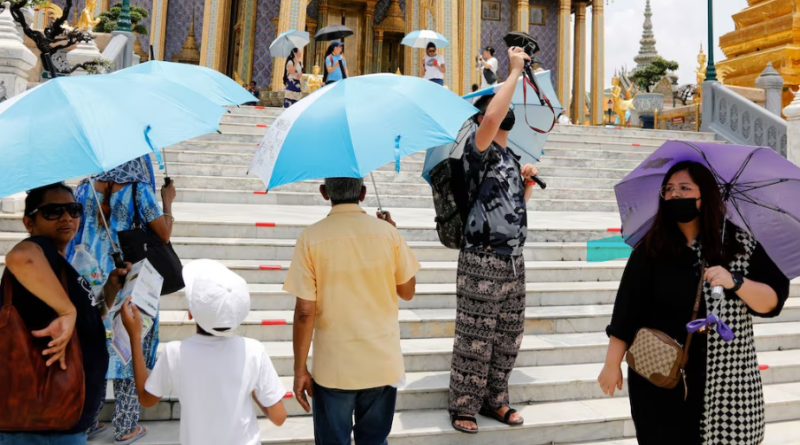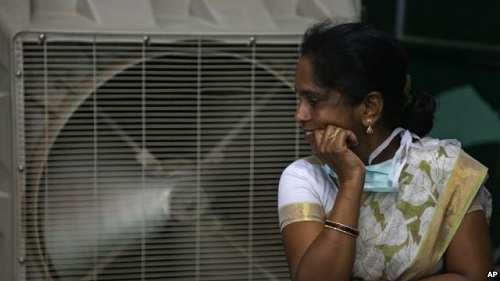Laos, Thailand, Cambodia and Vietnam All Experienced Temperature Spikes
Source: The Washington Post
A historic heat wave is bringing largely unprecedented temperatures to Southeast Asia, delivering a dangerous heat stress that could pose grave threats to vulnerable populations and smashing all-time records. Both Vietnam and Laos have recorded their hottest temperatures ever observed, in some places topping 110 degrees Fahrenheit — the latest in a string of global records that fit into the context of a warming climate.
Maximiliano Herrera, a climate historian who tracks temperature records, tweeted that the episode is “one of the most brutal heat event[s] the world has ever witnessed,” bluntly writing that “records are being pulverized.” In addition to Laos and Vietnam, widespread record heat is gripping Cambodia, Thailand and parts of China.

In some places, the extreme temperatures are fueling severe thunderstorms that have brought flooding as an unwelcome crescendo to the heat.
On Saturday, Luang Prabang in Laos made it to 110.3 degrees, beating out its 108.9-degree all-time record set just last month. Laos’s capital of Vientiane, home to roughly 1 million residents, made it to 108.5 degrees — its hottest on record. At least half a dozen other weather stations spiked above 40 degrees Celsius (104 Fahrenheit), and virtually every station either broke or came close to breaking all-time records.
Luang Prabang repeated its record Sunday. And Thakhek didn’t fall below 89.2 degrees on Saturday night, the nation’s hottest night on record.
Approximately 18.3 percent of Laotians live in poverty, and are far more likely to be harmed by elevated temperatures. It’s likely that significant excess mortality — or premature deaths caused by the intersection of heat stress and preexisting vulnerabilities — is occurring across Southeast Asia.
The same is true in Vietnam, where Hoi Xuan hit 111.4 degrees, a nationwide all-time record. The previous record was 110.1 degrees, set in 2019.
“Vietnam brutalized nearly every record from north to south,” tweeted Herrera.
Then Sunday proved even hotter — it reached 111.6 degrees in Tuong Duong.
In Thailand, meanwhile, a temperature station in downtown Bangkok hit 104.9 degrees on Saturday, the highest value ever recorded there. Sunday featured a high of 105.8 degrees. Averaged nationwide, it was Thailand’s hottest day on record. Just last month was the first time Thailand had ever recorded a reading of 45 degrees Celsius, or 113 Fahrenheit, anywhere in the country.
Cambodia set a new national May record, with 106.9-degree readings at Kratie and at Ponhea Kraek.
Saturday also featured record heat in China, including in Hainan province, which witnessed its hottest day ever observed. Changjiang hit 106.7 degrees.
In the Philippines, extreme temperatures have forced school closures, Bloomberg News reported.
Added atop the heat, there is toxic smog. Ground-level ozone is reaching unhealthy levels, making it hazardous to venture outdoors.
Causing the heat has been a seemingly unremarkable area of high pressure over Southeast Asia. It’s a rather typical heat wave, characteristic of this time of year, but pushed into record territory when added to the background of a warming world.
It’s especially difficult to get temperatures above 100 degrees in Southeast Asia due to the humidity. That makes air more resistant to warming up or cooling down. The fact that so many records were able to fall is a testament to the unprecedented nature of the air mass. It makes sense that the records are occurring in May, before the monsoon kicks in and brings deeper moisture in the summer months.
There exists a strong link between human-induced climate change and heat waves, which are made more severe, frequent and longer in duration due to the effects of human influence. The past eight years have been the eight warmest on record globally.
Peer-reviewed research indicates that tens of thousands of excess deaths occur annually in Southeast Asia due to extreme temperatures; it’s likely that similar tolls may be accompanying this heat wave.


